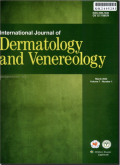10.3760/cma.j.issn.2096-5540.2018.03.004
Advance of genetic studies on HLA and psoriatic arthritis
Introduction Psoriatic arthritis (PsA) is a chronic autoimmune disease that primarily invades the skin and musculoskeletal system,and the prevalence of PsA is about 0.02%-0.67% in the adults”1”.Patients with PsA usually have psoriatic skin,which is caused by the attacking of keratinocytes by immune cells and includes epidermal hyperplasia,hyperkeratosis,parakeratosis,Munro”s microabscesses and mixed dermal infiltrates,and arthritis damage presenting peripheral arthritis,finger pain,cystitis and axial disease”2”.In general,the severity of patient” s joint symptoms is consistent with the severity of the skin lesions.PsA is progressive,and not only impacts the skin and joints,and also harms the life quality of patients.Patients with PsA are more likely to have a higher risk to suffer from cardiovascular events,depression and anxiety”3”.However,the pathogenesis of PsA is complex and not clear,it is generally believed that genetic and environmental factors both contribute to the pathology of PsA”4”.
1
2018-10-29(万方平台首次上网日期,不代表论文的发表时间)
共6页
151-156






